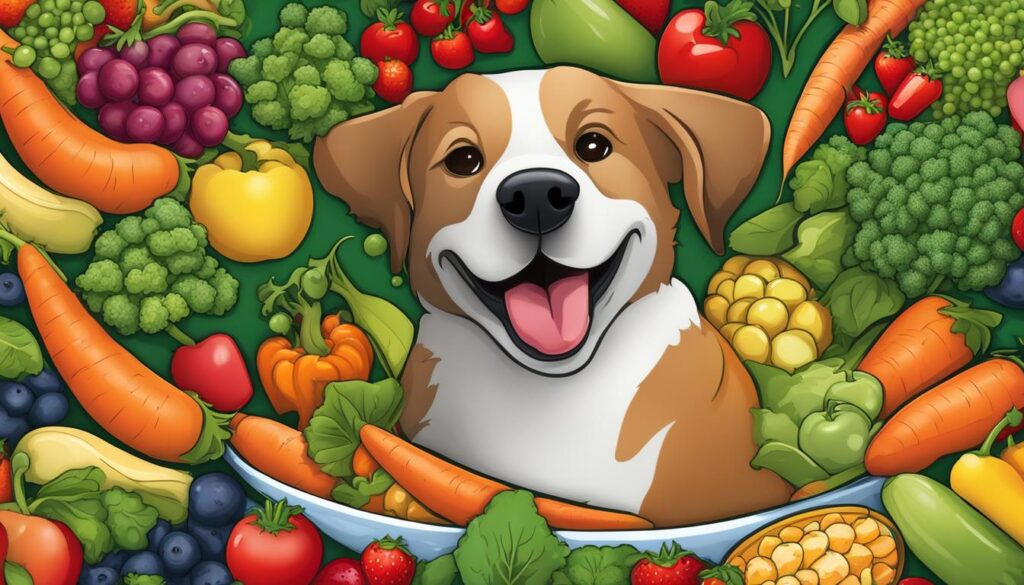Welcome to your ultimate vegan dog diet guide! If you’re considering a vegan diet for your furry friend, you’ve come to the right place. In this guide, we’ll explore the benefits of a vegan diet for dogs, provide you with options for vegan dog food, and highlight the health benefits of choosing plant-based meals for your canine companion.
Switching your dog to a vegan diet can have numerous health benefits. Unlike cats, dogs can thrive on plant-based diets and enjoy long, healthy lives. Not only can a vegan diet support digestion and maintain a healthy coat and skin, but it can also boost your dog’s immune system and reduce the risk of certain illnesses.
With a wide range of vegan dog food options available in the market, you can easily find brands that meet your dog’s nutritional needs. From canned food to kibble, there are various choices to suit your preferences and your dog’s dietary requirements.
Transitioning your dog to a vegan diet should be done gradually to avoid any digestive issues. Consult with your veterinarian to ensure you’re providing a balanced diet and meeting all your dog’s nutritional requirements. They can also recommend any necessary supplements to support your dog’s health.
By choosing a vegan diet for your dog, you’re not only improving their health but also making a positive impact on the planet. Meat farming contributes to greenhouse gas emissions and land degradation, while a plant-based diet helps reduce the environmental footprint associated with meat production.
In conclusion, a vegan diet can be a healthy and sustainable choice for your dog. With the right guidance and proper nutrition, your furry friend can thrive on a plant-based diet. So, let’s embark on this journey together and provide your dog with the ultimate vegan diet for a happy and healthy life!
The Benefits of a Vegan Diet for Your Dog
Switching your dog to a vegan diet can provide numerous health benefits. Canine veganism has gained popularity due to the positive impact it can have on your furry friend’s well-being. A well-planned vegan diet can support your dog’s digestion, coat and skin health, immune system, and overall nutrition.
Unlike meat-based diets, which can lead to gastrointestinal upset and allergies in dogs, plant-based diets offer ingredients like sweet potatoes and squash that can regulate bowel habits and reduce skin allergies. Vegan diets are generally lower in cholesterol and saturated fats, which reduces the risk of certain illnesses and promotes a healthier cardiovascular system.
Research suggests that nutritionally balanced vegan diets can be the healthiest and least hazardous choice for dogs.
Vegan diets can also provide essential vitamins and minerals through sources like tofu, quinoa, and nuts. These nutrient-rich foods contribute to your dog’s overall well-being and can help maintain their optimal health.
Table: Health Benefits of a Vegan Diet for Dogs
| Benefits | Explanation |
|---|---|
| Improved Digestion | Plant-based diets with fiber-rich ingredients regulate bowel habits and reduce gastrointestinal upset. |
| Healthy Coat and Skin | Vegan diets can reduce skin allergies and promote a shiny, healthy coat. |
| Boosted Immunity | Adequate nutrition from plant-based sources supports a strong immune system. |
| Reduced Risk of Illnesses | Lower cholesterol and saturated fat levels in vegan diets contribute to a healthier cardiovascular system. |
It is important to note that before transitioning your dog to a vegan diet, you should consult with a veterinarian to ensure it is the right choice for your dog’s specific nutritional needs.


How Vegan Diets Can Support the Planet
Choosing a vegan diet for your dog not only benefits their health but also has positive environmental impacts. By opting for plant-based dog food, you can contribute to reducing the environmental footprint associated with meat production. The meat farming industry is a significant contributor to greenhouse gas emissions and can cause land degradation and loss of biodiversity. Embracing a plant-based lifestyle for your dog supports a more sustainable and eco-friendly future.
According to research, the production of plant-based dog food requires fewer resources, such as land and water, compared to meat-based options. Additionally, vegan diets help reduce the demand for unsustainable fishing practices, protecting marine life and preserving the delicate balance of our oceans. When you choose plant-based dog food, you are making a conscious decision to support sustainable living and minimize the negative impact on the planet.


Benefits of Plant-Based Dog Food for the Environment:
- Reduces greenhouse gas emissions
- Minimizes land degradation and loss of biodiversity
- Preserves marine life by reducing unsustainable fishing practices
- Conserves resources such as land and water
By considering the health benefits and environmental impact of a vegan dog diet, you can provide your furry friend with a nutritious and sustainable lifestyle. Making small changes in your dog’s diet can have a significant positive effect on both their well-being and the planet.
Vegan Dog Food Options
When it comes to choosing vegan dog food options, there are several brands available in the market that can meet your dog’s nutritional needs. It is important to select brands that meet the nutritional standards set by organizations like the Association of American Feed Control Officials (AAFCO). Here are some popular vegan dog food brands to consider:
- Brand 1: This brand offers a range of plant-based dog food options that are formulated to provide a balanced diet for your furry friend.
- Brand 2: Known for their high-quality ingredients, this brand offers a variety of vegan dog food options that are free from animal by-products and fillers.
- Brand 3: With a focus on sustainability, this brand offers plant-based dog food made from organic ingredients.
It is important to note that not all vegan dog food options may be suitable for every dog. Each dog has unique dietary requirements, so consulting with your veterinarian is crucial in determining the best vegan dog food option for your pet.
Table: Comparison of Vegan Dog Food Brands
| Brand | Key Features | Price Range |
|---|---|---|
| Brand 1 | Plant-based, balanced nutrition | $ |
| Brand 2 | High-quality ingredients, no animal by-products | $$ |
| Brand 3 | Organic ingredients, sustainable | $$$ |
“Choosing a vegan dog food brand that meets nutritional standards is essential for your dog’s overall health and well-being. Look for brands that prioritize high-quality ingredients and provide a balanced diet for your furry friend.”
Remember, before making any significant changes to your dog’s diet, it is always recommended to consult with your veterinarian. They can guide you in selecting the best vegan dog food option that suits your dog’s specific needs and ensure they receive all the necessary nutrients for a healthy and happy life.


Transitioning to a Vegan Diet for Dogs
Transitioning your dog to a vegan diet requires careful planning and gradual adjustments. Abruptly changing their diet can cause digestive issues and discomfort. To ensure a smooth transition, start by mixing in about 10% vegan food with their current diet and gradually increase the percentage over a couple of weeks. This gradual transition allows your dog’s digestive system to adapt to the new diet.
Consulting with your veterinarian is crucial before making any drastic changes to your dog’s diet. They can provide guidance on the nutritional requirements and recommend any necessary supplements to ensure a balanced vegan diet for your dog. Every dog’s dietary needs are unique, and a professional can help you tailor the diet to meet your dog’s specific needs.
Considerations during the Transition
During the transition, monitor your dog for any signs of discomfort or adverse reactions. It’s important to be patient and observant to ensure that the new diet is suitable for your furry friend. If you notice any concerning symptoms or if your dog is having difficulty adjusting, consult your veterinarian immediately.
Ensuring a balanced vegan diet for dogs is essential. Your dog’s diet should include a variety of plant-based protein sources, such as lentils, quinoa, and tofu, to provide the necessary amino acids. It’s also important to incorporate a wide range of vegetables and fruits to provide essential vitamins and minerals.


Benefits of Transitioning to a Vegan Diet
Transitioning to a vegan diet can offer various benefits for your dog’s health and well-being. Some dogs may experience improved digestion, increased energy levels, and a healthier coat and skin. Additionally, a balanced vegan diet can help manage weight, reduce the risk of certain illnesses, and support overall longevity.
Remember, consulting with a veterinarian throughout the transition is vital to ensure the diet meets all of your dog’s nutritional needs. They can also provide guidance on adjusting the diet based on your dog’s specific health conditions or breed predispositions.
Homemade Vegan Dog Food Recipes
If you prefer to make homemade vegan dog food for your furry friend, there are several recipes available. Making your own dog food allows you to have full control over the ingredients and ensure that your dog receives a balanced and nutritious diet. Here are a few simple and delicious homemade vegan dog food recipes:
Vegan Lentil and Vegetable Stew
Ingredients:
- 1 cup cooked lentils
- 1 cup mixed vegetables (carrots, peas, green beans)
- ½ cup cooked quinoa
- 1 tablespoon olive oil
- 1 tablespoon nutritional yeast
- 1 teaspoon flaxseed oil
Instructions:
- In a large pot, heat the olive oil and sauté the mixed vegetables until tender.
- Add the cooked lentils, quinoa, nutritional yeast, and flaxseed oil to the pot.
- Stir well and simmer for 10-15 minutes.
- Let the stew cool before serving it to your dog.
Sweet Potato and Chickpea Patties
Ingredients:
- 1 cup mashed sweet potato
- 1 cup cooked chickpeas, lightly mashed
- ½ cup rolled oats
- 1 tablespoon ground flaxseed
- 1 tablespoon chopped parsley
- 1 teaspoon turmeric
Instructions:
- In a bowl, combine the mashed sweet potato, mashed chickpeas, rolled oats, ground flaxseed, chopped parsley, and turmeric.
- Mix well until all the ingredients are evenly incorporated.
- Form the mixture into small patties and place them on a baking sheet lined with parchment paper.
- Bake at 350°F (175°C) for 20-25 minutes or until the patties are firm and slightly golden.
- Allow the patties to cool before serving them to your dog.
Remember to consult with your veterinarian or a canine nutritionist to ensure these recipes meet your dog’s specific dietary needs. Homemade vegan dog food can be a healthy and satisfying option for your furry friend when prepared with care and attention to nutritional balance.


Considerations and Precautions
When it comes to transitioning your dog to a vegan diet, there are a few important considerations and precautions to keep in mind. While dogs can thrive on a vegan diet, it’s crucial to ensure that they receive all the necessary nutrients for their overall health and well-being. Consulting with a veterinarian or a canine nutritionist can help you create a balanced and nutritionally complete vegan diet plan for your furry friend.
One of the main concerns with a vegan dog diet is meeting their protein requirements. Dogs are primarily carnivores, and protein is essential for their muscle development and overall health. Plant-based protein sources like legumes, tofu, and quinoa can be incorporated into their diet, but it’s important to monitor their protein intake and consult with a professional to determine the right amount for your dog’s breed, size, and activity level.


Additionally, certain health conditions or breed predispositions may require additional dietary considerations. For example, some dogs may be more prone to certain nutrient deficiencies or have specific dietary restrictions due to allergies or sensitivities. Regular check-ups with your veterinarian can help ensure that your dog’s diet meets their individual needs and can address any potential health concerns.
While a vegan diet can provide many benefits for your dog’s health and reduce the environmental impact of meat production, it’s essential to approach it with caution and prioritize their well-being. By working closely with professionals and taking into account your dog’s unique requirements, you can provide them with a nutritious and balanced vegan diet that supports their overall health and longevity.
Conclusion
In conclusion, the vegan dog diet guide has highlighted the various options available for providing your furry friend with a nutritious and sustainable lifestyle. Dogs can thrive on a vegan diet if it is properly planned and meets all their nutritional needs. It is essential to choose high-quality vegan dog food options that meet the nutritional standards set by organizations like the AAFCO. Consulting with a veterinarian is crucial to ensure your dog’s health and well-being throughout the transition process.
Transitioning to a vegan diet should be done gradually and with caution to avoid any digestive issues. Remember to consult with professionals and consider your dog’s specific health conditions and breed predispositions. By prioritizing your dog’s health and well-being, you can make informed decisions about their diet and provide them with a long and healthy life.
So, if you’re considering a vegan diet for your dog, take the time to research and find the best vegan dog food options that suit your dog’s needs. With proper planning and consultation, you can provide your furry friend with a sustainable and nutritious diet that supports their overall health and well-being. Start your journey towards a vegan dog diet today!
FAQ
Can dogs thrive on a vegan diet?
Dogs can thrive on a properly planned and nutritionally balanced vegan diet. Unlike cats, dogs can meet their nutritional needs on a vegan diet without difficulty.
How do I transition my dog to a vegan diet?
It is important to transition your dog to a vegan diet gradually. Start by mixing in about 10% vegan food with their current diet and slowly increase the percentage over a couple of weeks. Consult with your veterinarian before making any drastic changes to your dog’s diet.
What are the health benefits of a vegan dog diet?
A vegan diet for dogs can support digestion, maintain a healthy coat and skin, boost immunity, and provide essential nutrients. It can also reduce the risk of certain illnesses by being lower in cholesterol and saturated fats.
How can a vegan diet benefit the environment?
Opting for plant-based dog food helps reduce the environmental footprint associated with meat production. Meat farming contributes to greenhouse gas emissions and can degrade land and biodiversity. A vegan diet also reduces the demand for unsustainable fishing practices, protecting marine life.
What are the options for vegan dog food?
There are several vegan dog food brands available in the market that meet nutritional standards set by organizations like the AAFCO. Some popular options include (brand names can be mentioned here). Consult with your veterinarian or do thorough research to find the best vegan dog food for your furry friend.
Are there homemade vegan dog food recipes available?
Yes. If you prefer to make homemade vegan dog food, you can find several recipes online. Ingredients like sweet potatoes, lentils, quinoa, and various vegetables can be used. It is crucial to consult with your veterinarian or a canine nutritionist to ensure the recipes provide all the necessary nutrients for your dog’s health.
Are there considerations and precautions for a vegan dog diet?
Yes. Dogs have specific nutritional requirements, so it is important to consult with a veterinarian or a canine nutritionist to ensure your dog is receiving all the necessary nutrients. Certain health conditions or breed predispositions may require additional dietary considerations. Regular check-ups and a customized approach to your dog’s diet can help ensure their overall health and well-being.

